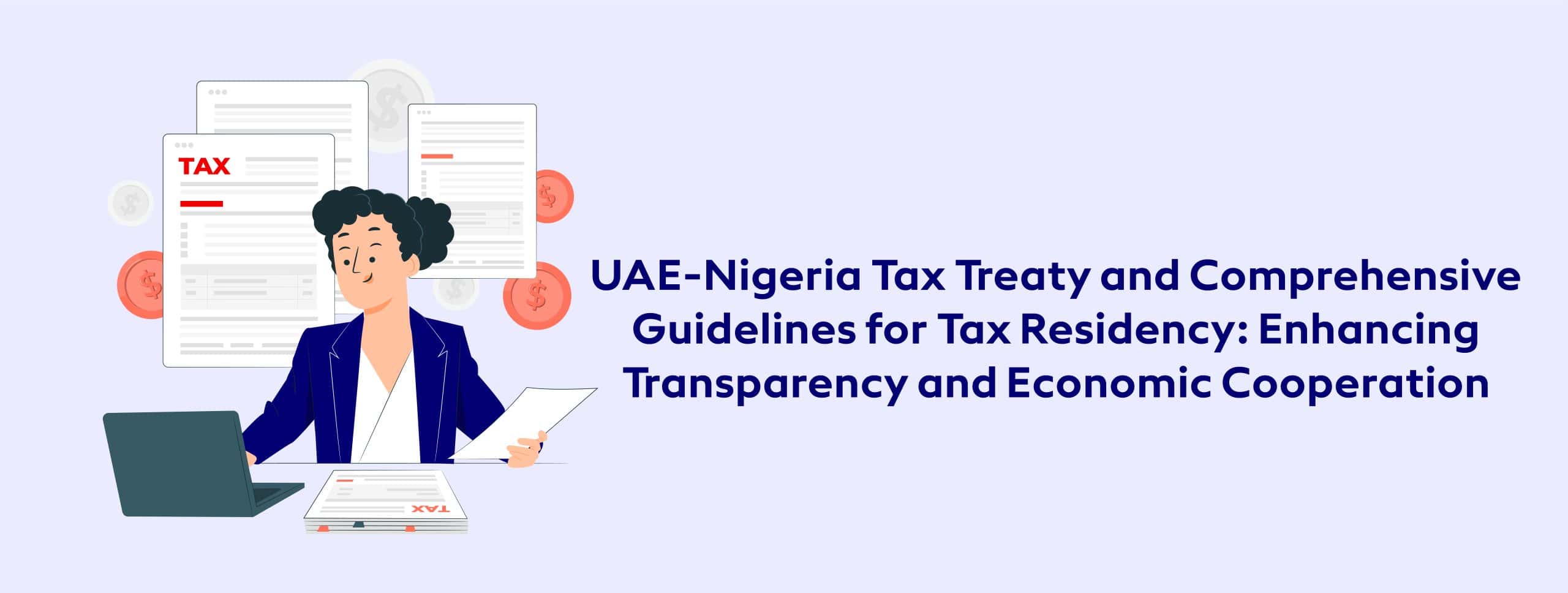Tax Treaty and Comprehensive Guidelines for Tax Residency
In recent developments within the tax landscape of the United Arab Emirates (UAE), significant strides have been made to foster transparency and eliminate double taxation. The Nigerian government has granted approval for a doubletax treaty with the UAE, aiming to create a favorable business environment for both nations. Additionally, the UAE has implemented comprehensive guidelines for determining the tax residency of global companies, ensuring fairness and transparency in the corporate_tax regime.
Eliminating Double Taxation: Nigeria-UAE Double Tax Treaty
Lateef Fagbemi, the Attorney-General of the Federation and Minister of Justice, announced the approval of a new taxation agreement between Nigeria and the UAE. This agreement, once ratified by the National Assembly, will serve as a crucial step in eliminating double taxation, thereby promoting economic cooperation between the two countries. By removing tax obstacles for businesses and investors, the treaty aims to encourage foreign direct investment and strengthen the bilateral relationship.
Comprehensive Tax Treaty Coverage
The agreement between Nigeria and the UAE covers various tax types, including personal income tax, company income tax, petroleum profit tax, information technology levy, tertiary education tax, and capital gain tax. This comprehensive coverage ensures that businesses and individuals are protected from the burden of double taxation across multiple areas of their financial activities.

Elevating the Treaty to a Formal Agreement
The involvement of the National Assembly in the ratification process demonstrates the commitment to elevate the double tax treaty beyond a regular contract. By making it a formal treaty between two sovereign nations, both Nigeria and the UAE emphasize the significance of this agreement in promoting economic growth, attracting investments, and enhancing bilateral cooperation. Furthermore, the intention to extend such treaties to other countries highlights the UAE’s proactive approach in fostering international tax relations.
Ensuring Fair and Transparent Tax Residency Determination
In its pursuit of a fair and transparent corporate tax regime, the UAE has established comprehensive guidelines for determining the tax residency of entities operating within its borders, irrespective of their origin. These guidelines rely on the concept of “place of effective management” (PoEM), a globally recognized test that assesses where vital management and business decisions essential for a company’s operation are made. The UAE recognizes that the location where the highest level of management decisions is made is a key factor in determining tax residency. However, other considerations, such as the residence of controlling shareholders, delegated decision-making powers, or the location of board members and executive management, may also be taken into account. Importantly, only one place of effective management and control is admissible at any given time. It is noteworthy that the residency of board members (or equivalent) within the UAE is not mandatory for the PoEM to be considered within the UAE.
Conclusion
The UAE’s recent steps in tax reform showcase its commitment to fostering transparent and fair tax practices. The approval of the Nigeria-UAE double tax treaty and the implementation of comprehensive guidelines for tax residency determination exemplify the UAE’s proactive approach to attract investments and promote international economic cooperation. These developments provide businesses and investors with the assurance of a favorable tax environment while reinforcing the UAE’s position as a global business hub.

Evaluate major expense categories to ensure they meet the tax deduction requirements, especially those specifically regulated by the tax legislation.
Assess your transfer pricing model to ensure alignment with the operating model and design policies that adhere to the arm’s length principle.
Identify any foreign entities that may be subject to corporate tax in the UAE based on their presence or activities in the country.
Consider utilizing elections and claims allowed by the CT legislation to optimize the tax burden.
Ensure operational readiness by establishing effective finance and tax operations, processes, and IT systems.
Generate separate Trial Balances for each entity as required by the CT Law and review the Chart of Accounts to track tax-exempt incomes, qualifying versus non-qualifying incomes for Free Zone entities, non-deductible expenses, and transfer pricing adjustments.
Determine how the governance of UAE corporate tax will be managed and consider necessary adaptations or changes to IT systems and the Tax Department.
Clearly define and formalize responsibilities between the Tax Department and other teams within the organization, and provide awareness and training to non-tax functions.
These priorities will help businesses navigate the upcoming corporate tax regime in the UAE, ensuring compliance and effective tax management. By proactively addressing these areas, companies can optimize their tax positions and adapt to the changing tax landscape in the UAE.
Navigating the UAE Tax Landscape in 2024: A Comprehensive Guide
As the UAE prepares for significant changes in its tax landscape in 2024, businesses must equip themselves with the necessary knowledge and strategies to ensure compliance and optimize their tax positions. In this guide, Guildhall provides a comprehensive overview of the upcoming corporate tax regime, including rates, obligations, exemptions, and essential steps every business should take.
Three Key Actions for Every Business
To navigate the changing tax landscape effectively, businesses should focus on three key actions:
- Registration for Corporate Tax: Starting from June 2023, businesses need to register for corporate tax to comply with the new regulations.
- Maintaining Proper Accounting Records: Keeping accurate and up-to-date accounting records is crucial to meet legal requirements and facilitate the tax filing process.
- Corporate Tax Submission: After the first taxable period, businesses must file a corporate tax submission with the Federal Tax Authority (FTA) to fulfill their obligations.
Differentiating Free Zone and Non-Free Zone Companies
One significant distinction between Free Zone and non-Free Zone companies lies in taxation. Free Zone companies have the opportunity to benefit from a 0% tax rate, provided they meet specific conditions. However, as of January 1, 2024, the UAE will implement a corporate tax regime applicable to many businesses, with a tax rate of 9% for companies earning profits above AED 375,000.
Apart from taxation, there are other differences between Free Zone and non-Free Zone companies. Free Zone entities enjoy exemptions from import and export duties, 100% foreign ownership, and no requirement for a local sponsor. In contrast, non-Free Zone companies must have a local sponsor who owns at least 51% of the company’s share capital.
Understanding Mainland vs. Free Zone Company Setup Options
When deciding between setting up a mainland or Free Zone company in the UAE, it’s essential to consider various factors. There is no one-size-fits-all answer, as the choice depends on client needs, location, and the nature of business activities.
Mainland companies offer advantages such as fewer restrictions on business activities and the ability to trade freely within the UAE. However, the requirement for a local sponsor can pose challenges for foreign investors seeking reliable partners in a foreign country.
On the other hand, Free Zone companies permit conducting business within the jurisdiction of Free Zones or outside the UAE. They allow 100% foreign ownership and offer flexibility in office space requirements.

Key Criteria for Mainland and Free Zone Companies
To help businesses make informed decisions, here is a summary of key criteria for each setup type:
Mainland:
– Business ownership: Many mainland businesses require 51% local ownership, but full foreign ownership is allowed for over 1,000 activities since June 2021.
– Scope of business: Includes operations inside and outside the UAE.
– Office space: Minimum office space required after one year, depending on the number of visas needed.
– Residence visa: Number of visas relates to the rented office space.
– Financial records/audit: Financial auditing is mandatory.
– Share capital: No standard requirement, determined by the legal structure.
– Incorporation process: Documentation in Arabic, with the presence of company founder(s) in the UAE or a fully attested Power of Attorney.
Free Zone:
– Business ownership: 100% full foreign ownership.
– Scope of business: Limited to Free Zones or outside the UAE.
– Office space: Flexibility in offering setups with or without office space based on business activity and employee count.
– Residence visa: Virtual office agreements include a specific number of visas, while physical offices are linked to visa applications.
– Financial records/audit: Not all free zone entities require financial audits, but it is recommended.
– Share capital: Varies between free zones with different deposit proof requirements.
– Incorporation process: English and Arabic jurisdiction language, with digital signing and remote options available in many free zones
Conclusion
As the UAE prepares to implement its corporate tax regime, businesses must proactively adapt to the changing tax landscape. By understanding the registration process, maintaining accurate records, and fulfilling tax obligations, businesses can ensure compliance and optimize their tax positions. Additionally, the choice between mainland and Free Zone company setups requires careful consideration of various factors to align with specific business needs. With the right knowledge and strategies, businesses can navigate these changes successfully and thrive in the UAE’s evolving tax environment.
AHG provide special VAT services in the UAE as an Approved Tax Agency Number (TAN) 30003727 and with several Approved Tax Agents under AHG so we can provide our clients with the best advice.
AHG as an Approved Tax Agency in the FTA (Federal Tax Authority) can provide a wide range of Services in the UAE whether VAT or Excise Tax.

